This guide initially displays common reptiles and amphibians of all shapes. Use the selectors below to view particular shapes, include rare species, or search by name.
Reptiles are a group of vertebrate animals that are cold-blooded, i.e., they regulate their inner body temperature by responding to the temperature of their environment, basking in the sun to warm themselves up or lying in the shade to cool off. Animals in the class Reptilia include snakes, lizards, crocodiles, turtles and tortoises. All of these creatures are covered in scales and breathe air through their lungs throughout their lifetime. In addition, they all produce eggs. Most reptiles lay eggs from which young hatch directly after an incubation period. However, some snakes, including rattlesnakes, carry their eggs internally and then give birth to live young.
Like reptiles, amphibians (frogs, toads, newts, salamanders and worm-like caecilians) are cold-blooded vertebrates. However, unlike reptiles, animals in the class Amphibia do not have scales but rather have skin that is permeable so that molecules and gases can pass through it. In addition, they lay their eggs in water where the young are born as larvae using gills to breath. The larvae grow and change into the adult form. This process includes developing lungs thus allowing the adults to live on land. Amphibians are considered to be the link between fish and reptiles as they were the first animals to leave the water and come onto land.
The question often arises of how to tell the difference between a frog and a toad. Although they are closely related amphibians, there are some features that can be used to distinguish them. Frogs have long hind legs for jumping, moist and usually smooth skin and bulging eyes. In addition, they typically stay in water. Toads have short legs for walking and hopping, dry and bumpy skin and do not have bulging eyes but do have poison glands behind their eyes. They mostly stay on land.
This guide describes the modest number of amphibians and reptiles including two venomous snakes that can be found in Los Alamos and the surrounding areas. An excellent reference for more information is Amphibians and Reptiles of Los Alamos County by Teralene S. Foxx, Timothy K. Haarmann, and David C Keller.
Reptile and Amphibian References
Amphibiaweb
Amphibians and Reptiles of Los Alamos County [PDF]
Bartlett, R.D., Bartlett, P.P., 2013 New Mexico’s Reptiles and Amphibians: A Field Guide. University of NM Press
Biota Information System of New Mexico
Degenhardt, W.G., Painter, C.W., Price, A.H., 2005 Amphibians and Reptiles of New Mexico. University of NM Press
eNature
Encyclopedia of Life
New Mexico Herpetological Society
The Reptile Database
Subject Area Experts (all guides)
Steve Cary (butterflies)
Beth Cortright (insects)
Terry Foxx (invasive plants)
Leslie Hansen (mammals)
Richard Hansen (fish, mammals)
Dorothy Hoard (butterflies, trees)
Chick Keller (flowers, herbarium)
Shari Kelley (geology)
Kirt Kempter (geology)
Garth Tietjen (reptiles)
David Yeamans (birds)
Web Development and Content Management
Pat Bacha
Jennifer Macke
Graham Mark
Akkana Peck
Contact
Please contact us for local nature questions and sightings. We welcome comments, corrections, and additions to our guides.
For more information about local nature, please visit our Nature Blog or subscribe to PEEC This Week.
Make Selection
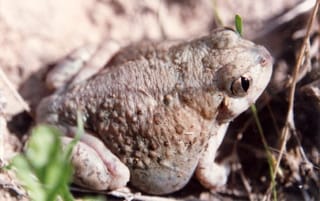 Photo: Teralene Foxx 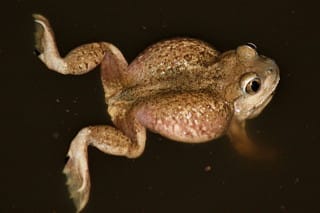 Photo: J.N. Stuart |  New Mexico Spadefoot Toad(Spea multiplicata)Family: Scaphiopodidae (Spadefoot Toads) Size: 1.5 - 2.3 in (4 - 6 cm) Status: native; uncommon Habitat: arid and semiarid areas near breeding pools Typical location: Rio Grande at lower elevations, White Rock Canyon Nocturnal. There are two species of spadefoot toads that may be found in New Mexico, the New Mexico Spadefoot (S. multiplicata) and the Plains Spadefoot (S. bombifrons). All spadefoots have smooth skin and darkened horn spades on their hind feet. They have vertical pupils in their eyes. The species spends most of its life buried in soil, emerging to breed only when conditions are right. Spadefoot toads are adapted to arid conditions. When the summer temperature and moisture is just right they will quickly breed and produce hundreds of tadpoles. Some years they do not breed at all. Tracks Info Photos Distribution Featured |
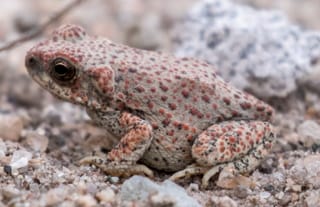 Photo: Mouser Williams 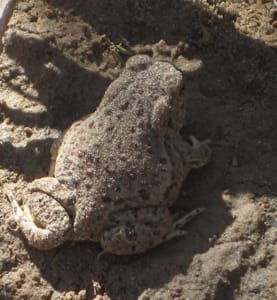 Photo: Akkana Peck |  Red-spotted Toad(Anaxyrus punctatus, Bufo punctatus)Family: Bufonidae (Toads) Size: 1.5 - 8 in (4 - 20 cm) Status: native; rare Habitat: desert and rocky areas near source of permanent water; up to 6,000 ft (1,800 m) Typical location: Frijoles Canyon, Rio Grande in wetland areas Secretive. This toad can be found in burrows and beneath rocks during dry periods. Juvenile Woodhouse's Toads have red spots and may be mistaken for this species. Tracks Info Photos Distribution |
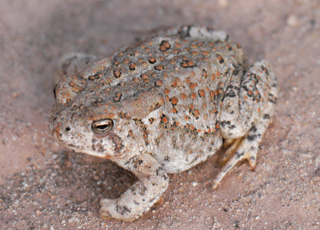 Photo: juvenile by Bernard Foy 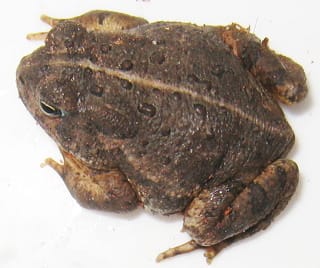 Photo: adult by Jennifer Macke |  Woodhouse's Toad(Anaxyrus woodhousii, Bufo woodhousii)Family: Bufonidae (Toads) Size: 2.5 - 5 in (6 - 13 cm) Status: native; uncommon Habitat: sandy areas near marshes, irrigation ditches, backyards, rain pools Typical location: Rio Grande in wetland areas Secretive. This toad can be identified by its dry skin covered with many warts of different sizes. The overall body color is patterned olive-green or greenish over a darker color with a light stripe down the middle of the back. The belly is whitish and there are many dark spots on the chest between the forelegs. It lives near permanent water and rests in shallow burrows during the day. Tracks Info Photos Distribution Featured |
